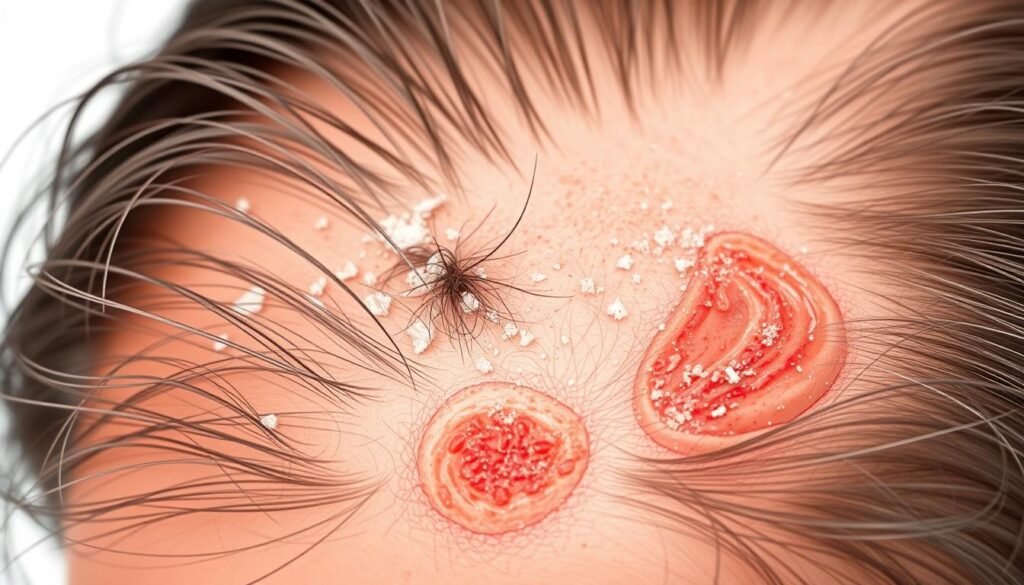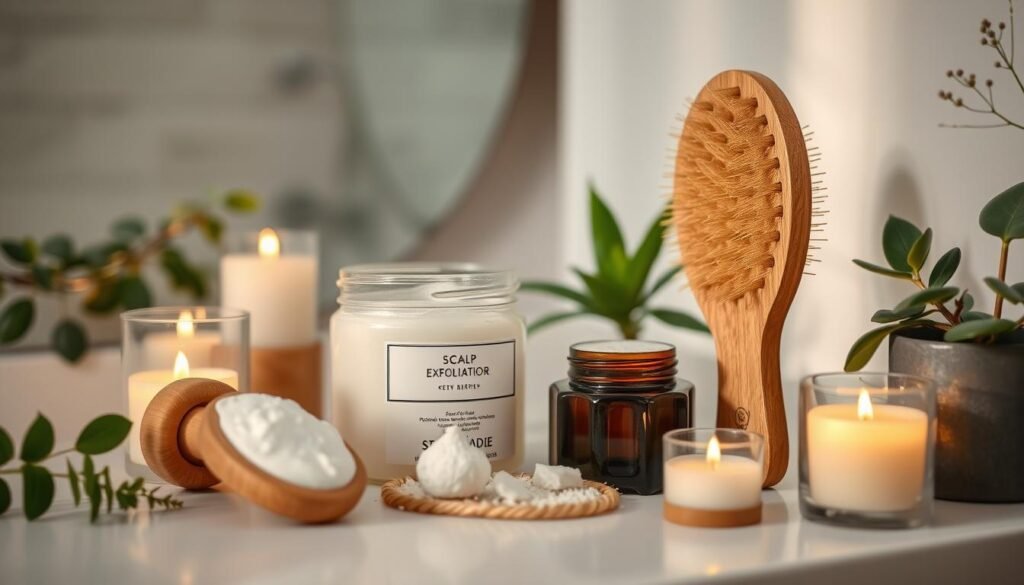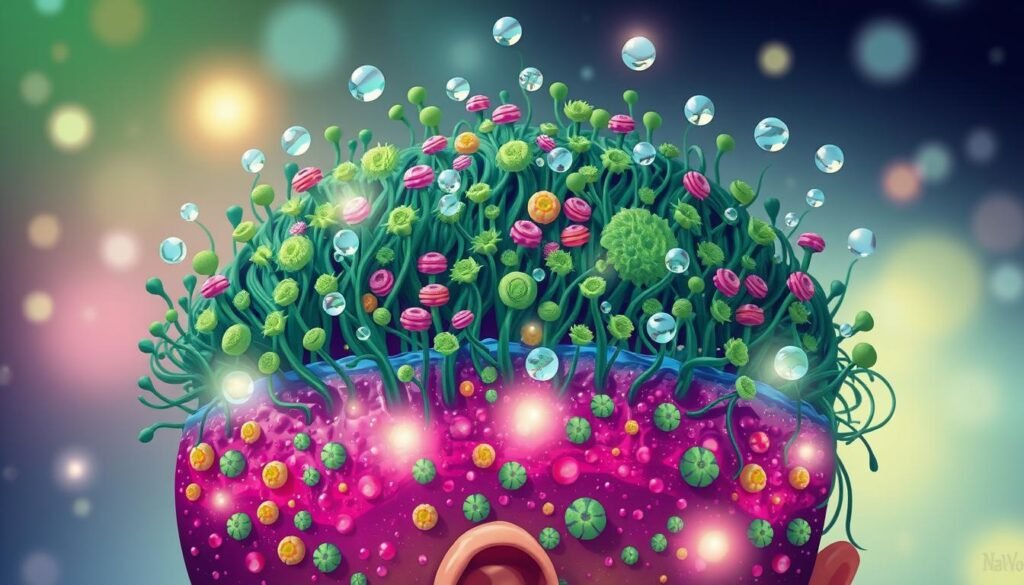Did you know cleaning your hair and scalp once a week is advised? Many still don’t focus on keeping their scalp hydrated for beautiful hair. Beautiful hair starts with a healthy scalp, not just style or cuts. This piece will talk about how keeping your scalp hydrated helps your hair look great. We will show that good scalp care is the start of amazing hair. We’ll give you useful tips and ways to make your hair look its best.
Key Takeaways
- Regular scalp cleansing is essential for maintaining health, ideally once a week.
- Substituting oil-based products with oil-free humectants like glycerin promotes moisture retention.
- Boosting circulation through scalp massage enhances nutrient delivery to hair follicles.
- Using sulfate-free shampoos maintains the scalp’s natural oil balance.
- Exfoliating the scalp aids in removing dead skin cells and product buildup.
The Importance of a Healthy Scalp
A healthy scalp is key for having strong and vibrant hair. The importance of scalp health is huge because it affects how we look and helps avoid hair problems. Issues like dandruff, itchiness, and hair loss can be minimized with proper scalp care.
Problems can also arise from a sensitive or dry scalp. These issues might be caused by not drinking enough water or using strong chemicals on your hair.
New studies show that taking good care of your scalp can also help your hair grow. If you have an oily, dry, or red scalp, it means you need to take better care of it. Using gentle shampoos that don’t have sulfates can help keep your scalp healthy. It’s important to follow scalp care tips for healthy hair.
If you have dandruff, eczema, or scalp psoriasis, you might need special treatments. Using products with natural ingredients like willow bark or green tea can help a lot. Plus, eating foods full of vitamins, antioxidants, and fatty acids is key for a healthy scalp.
Understanding Hydration and Healthy Scalp
Drinking enough water is key for a healthy scalp. This helps keep hair looking great. Keeping the scalp moist stops it from getting dry, itchy, and flaky. This makes a perfect place for hair to grow. Things like weather, harsh hair stuff, and stress can make the scalp dry. This hurts scalp health and can make hair quality drop.
What Hydration Means for Your Scalp
Keeping the scalp moist stops dandruff and dead skin from piling up. A moist scalp supports good bacteria and keeps bad ones away from hair roots. Too much oil, though, can block pores and slow down hair growth.
Michiru Scalp Tonic makes the scalp less dry in about two weeks. Brushing and gentle scalp rubs spread natural oils and boost blood flow. This helps make the scalp a better place for hair.
The Link Between Scalp Health and Hair Quality
Healthy scalps mean better hair. A well-taken-care-of scalp keeps hair roots strong. This leads to shiny, strong hair. Ignoring scalp health can cause irritation and weak hair that breaks easily.
Stress can make scalp problems like dryness worse. This can make more hair fall out or break. Eating foods with omega-3 fats helps keep moisture in the scalp. This makes the scalp healthier. For more tips on keeping your scalp moist, check out this guide.
Moisturizing Scalp Care Essentials
Finding the right moisturizing scalp products is key. Many options are out there, but it’s crucial to know which ones meet your needs. Look for items that keep your scalp hydrated but don’t strip it of its natural oils. Choose gentle shampoos and nourishing conditioners. Ingredients like coconut oil and biotin are great for maintaining a healthy scalp.
Choosing the Right Products for Your Scalp
Pick scalp products that have ingredients backed by science. The Micro-Exfoliating Shampoo, for example, can reduce dry scalp flaking by 82% and double the hydration. After the first use, 91% of users felt less itchiness. It’s also important to choose products that don’t harm animals. Companies like Aveda that are B Corp certified are known for their ethical practices.
| Product | Key Benefits | User Satisfaction |
|---|---|---|
| Micro-Exfoliating Shampoo | Reduces flaking, increases hydration | 91% felt less itchiness |
| Dry Shampoo | Aerosol-free, 95% naturally derived | 100% vegan products |
Homemade Remedies for Scalp Moisturization
For those into natural care, homemade remedies work well. You can make effective treatments with what’s in your kitchen. Mix coconut oil, honey, and aloe vera to create a moisturizing scalp mask. This combo hydrates the scalp, lessens irritation, and fights dryness.
- Coconut Oil: Known for its penetrating moisture properties.
- Aloe Vera: Provides soothing relief and hydration.
- Honey: A natural humectant that draws moisture in.
Dry Scalp Remedies for Everyday Care
To keep your scalp healthy, it’s important to know when it’s dry. Look out for Dry Scalp Symptoms like flakiness, itchiness, and redness. These are warning signs. Catching them early can stop bigger issues later. This means you can act fast to keep your scalp and hair healthy.
Signs of Dry Scalp to Watch For
Look for these common dry scalp signs:
- Flakiness: Small white or yellowish flakes on the scalp and in hair.
- Itchiness: A constant need to scratch your scalp.
- Irritation: Redness or discomfort on your scalp.
Using products that are too harsh or washing too much can dry out your scalp. Turning down the heat when you wash your hair helps too.
Effective Treatments to Combat Dryness
There are many Dry Scalp Treatments that work well. It’s key to moisturize, especially when it’s cold. Some top picks are:
- Moisturizing oils: They’re crucial for adding moisture back.
- Sulfate-free and paraben-free shampoos: They clean gently without drying.
- Supplements: Omega-3, zinc, and vitamins A, B, and C can help hydrate.
Drinking lots of water is also important for your scalp. Too much sugar, though, can make dryness worse. It can even cause your hair to thin.
If you’re dealing with ongoing issues like dandruff, a dermatologist can help. They offer expert Scalp Care Solutions. At home, try tea tree oil shampoo or avocado oil. They can make a big difference. For more home remedies, click here.

Hair Nourishment Through Scalp Care
A well-maintained scalp is key to strong hair. It’s all about feeding the scalp with the right nutrients. This ensures your hair grows in healthily and stays vibrant. Including vitamins and minerals in your diet is crucial for a Nourishing Scalp for Hair Growth.
How a Healthy Scalp Contributes to Stronger Hair
A healthy scalp means strong hair. It makes a perfect home for hair roots, helping them thrive. But, dry and flaky scalps can lead to weak hair. Using products like the Scalp Revival™ collection can help. They moisturize the scalp, combating dryness and flakiness.
This keeps hair from falling out too much. It’s all about keeping the scalp happy and healthy.
Key Nutrients for Scalp and Hair Health
Good nutrition is crucial for your scalp and hair. Vitamins A, C, E, and B-vitamins, proteins, and omega fatty acids are all beneficial. They boost blood flow to the scalp, feeding your hair roots. Eat foods loaded with these nutrients as part of a Healthy Hair Diet.
| Nutrient | Sources | Benefits for Scalp and Hair |
|---|---|---|
| Vitamin A | Carrots, sweet potatoes, spinach | Promotes sebum production for scalp moisture |
| Omega-3 Fatty Acids | Fish, walnuts, flaxseeds | Maintains scalp moisture, preventing dryness |
| Vitamin E | Nuts, seeds, avocados | Enhances blood circulation, promoting hair growth |
| Vitamin C | Citrus fruits, bell peppers, strawberries | Supports collagen production, strengthening hair structure |
| B-Vitamins | Whole grains, eggs, meat | Helps improve nutrient absorption for healthy hair |
Eating right helps keep your scalp and hair healthy. Regular washing is also essential to stop buildup. You can find tips on proper scalp cleansing here.
Scalp Revitalization Techniques
Looking for ways to improve hair health starts with the scalp. By adding practices like scalp exfoliation and massage, your scalp becomes healthier. These steps can lead to better hair growth and a nicer hair look.
Exfoliating Your Scalp for Optimal Health
Keeping a healthy scalp means getting rid of dead skin and opening hair follicles. Regularly removing sebum and product leftovers prevents scalp problems. You can use different tools and methods for this, such as:
- Scalp scrubs: Many brands offer special scrubs that clean your scalp.
- Exfoliating brushes: These brushes are made to boost circulation and get rid of dead skin.
- DIY remedies: Mixing natural stuff like sugar or sea salt with oils makes a good scrub at home.
To see the best effects, exfoliate every 2-4 weeks, based on what your scalp needs. This makes your scalp healthier and helps nutrients reach the hair better.
Benefits of Scalp Massage for Hair Growth
Adding scalp massage to your routine brings lots of benefits. Regular massages improve blood flow, ensuring the hair gets the nutrients it needs. Here’s how you can do it effectively:
- Use of oils: Oils like coconut or castor provide moisture and help you relax.
- Fingertip techniques: Moving your fingertips in circles gently stimulates the scalp.
- Frequency: Try massaging your scalp 2-3 times a week for 5-10 minutes each time for the best effects.
Scalp massages are not just relaxing. They also reduce stress, which can help with hair loss. People with thin or dull hair often see their hair texture improve with regular massages.

Understanding Sebum Production
Sebum is key for a healthy scalp and hair. It’s made by sebaceous glands and stops water from evaporating. This keeps moisture locked in. Knowing about sebum’s role shows us how its imbalance affects scalp health.
What is Sebum and Why It Matters
Sebum is a mix of fatty acids, waxes, and more. It’s mostly triglycerides and fatty acids (57%), wax esters (26%), squalene (12%), and cholesterol (4.5%). The amount of sebaceous glands on the scalp varies. This means people have different sebum levels and hair looks. The right amount of sebum keeps the scalp moist. But too much or too little can cause dryness, oiliness, or irritation.
Balancing Sebum Levels for Hair Vitality
It’s important to keep sebum levels balanced for healthy scalp. Things like hormones, what you eat, and your environment affect it. For example, certain medications can change sebum production. To keep a healthy scalp, try these:
- Drink more water to stay hydrated.
- Add omega-3s to your diet to manage sebum.
- Steer clear of strong shampoos that remove natural oils.
- Use lukewarm water when washing your hair to protect it.
It’s important to know the signs of sebum imbalance to fix scalp problems. For more advice on managing sebum, check out this info on sebum buildup.
Exploring the Scalp Microbiome
The scalp microbiome is vital for scalp health and hair growth. It has a diverse ecosystem of microorganisms. These microorganisms play a big part in scalp health. Knowing about them helps us understand how to avoid scalp problems like dandruff.
The Role of Microorganisms in Scalp Health
A study of 140 Indian women found a link between scalp health and specific microbes. Key bacteria found were Propionibacterium acnes and Staphylococcus epidermidis. Dandruff was often seen with certain Malassezia fungi. This shows fungi’s big role in scalp health.
Fungal and bacterial communities were studied. Fungi were involved in sticking to scalp cells, linked with dandruff. Bacteria helped make amino acids and vitamins. These are needed for a healthy scalp and hair growth.
How to Maintain a Balanced Scalp Microbiome
Keeping the scalp’s flora balanced is essential. There are ways to keep your scalp microbiome healthy:
- Use probiotic-rich products for good bacteria growth.
- Avoid harsh chemicals that upset the scalp’s microorganisms.
- Eat foods rich in vitamins for scalp and hair health.
- Keep clean to manage harmful microorganisms.
- Use natural oils like coconut oil, which change microbial numbers for the better.
A balanced microbiome is key not just for looks. It helps avoid dandruff and boosts hair health. Knowing about scalp microbes helps us care for our hair better.

| Microbial Species | Role in Scalp Health | Association with Conditions |
|---|---|---|
| Propionibacterium acnes | Bacterial health and balance | Promotes healthy scalp |
| Staphylococcus epidermidis | Protective barrier | Reduces scalp infections |
| Malassezia globosa | Fungal balance | Higher abundance in healthy scalps |
| Uncharacterized Malassezia species | Potential pathogenic role | Linked to dandruff |
Natural Hair Hydration Strategies
Keeping your hair hydrated is more than just washing it often. Using special ingredients can boost Scalp Hydration and improve hair health. Essential oils are a top choice for natural hair care. They fight dryness and keep moisture in.
Essential Oils for Scalp Hydration
Adding essential oils to your hair care can do wonders. Oils like jojoba, tea tree, and lavender are great for hydration. They nourish the scalp and help with dry flakes and irritation. Mix these oils with a carrier like coconut or olive oil for a gentle moisturizing treatment. This mix ensures your scalp gets moisture without irritation.
DIY Masks for Adding Moisture to Hair
Making DIY Hair Masks is a wallet-friendly way to moisturize hair. Here are some easy recipes:
- Coconut and Honey Mask: Mix 2 tablespoons of coconut oil with 1 tablespoon of honey for deep hydration.
- Aloe Vera and Olive Oil Treatment: Blend 2 tablespoons of aloe vera gel with 1 tablespoon of olive oil for a calming mask.
- Egg and Essential Oil Blend: Beat 1 egg with a few drops of rosemary or lavender oil for scalp moisture.
Use these masks once or twice a week for better hair texture and hydration. These natural treatments are also kinder to the environment than store-bought ones. They use the nourishing power of nature. For more on hydrating ingredients, check out this resource.
Conclusion
Keeping a healthy scalp is key to beautiful hair. This article shows how hydration and good scalp care are vital. A diet full of important nutrients is also crucial for strong, good-looking hair.
Using regular scalp treatments and the right cleansing routines can solve hair problems like dandruff and dryness. Remember, stress and lifestyle choices also play a big role in hair health. For more on how dandruff impacts hair growth, check out this detailed guide.
Focusing on scalp health is a smart move for great hair. By adopting these habits, you’ll create the perfect conditions for your hair to grow well. This helps avoid common hair issues, leading to lush and healthy hair.